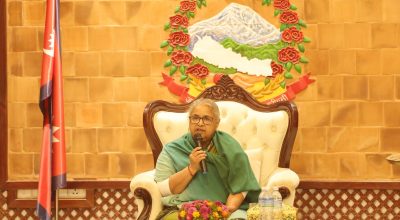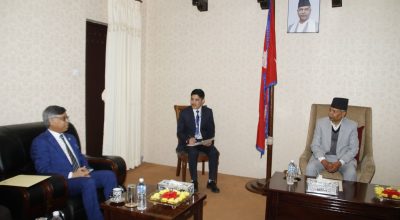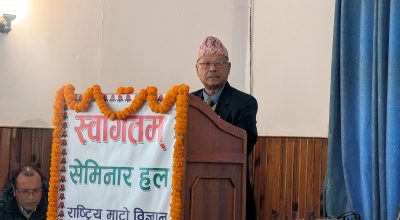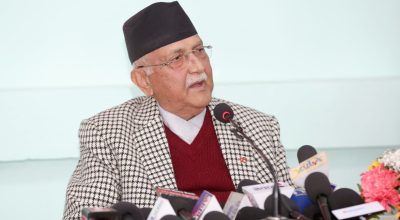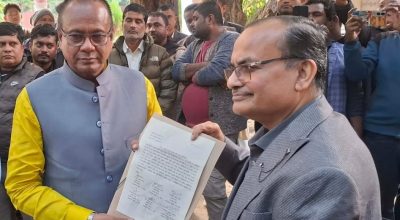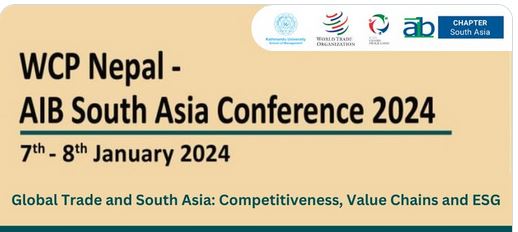
Kathmandu, Jan 7: A two-day ‘ WCP Nepal-AIB South Asia Conference, 2024’ commenced here today. The event jointly organised by the World Trade Organisation (WTO) Chairs Programme Nepal and Kathmandu University is themed ‘Global Trade and South Asia: Competitiveness, Value Chains and ESG’.
Addressing the event, KU’s Registrar Professor Achyut Wagle advised Nepal to adopt a specific commerce policy, especially considering its transition to a middle-income category.
As he suggested, Nepal should promote good production along with forward and backward linkages to compete in the global market.
Similarly, underling the need of formulating advanced foreign trade policies, Professor S Raghunath, the AIB-SAC Executive Board Chair, hoped for conference’s role in this regard.
He highlighted global inter-dependency for an easy supplies chain, seeking an equal participation and contribution in the supply chain. He underscored the importance of utilizing innovations and intellectual rights to promote locally produced products.
Secretary at the Ministry of Industry, Commerce and Supplies, Narayan Prasad Sharma Duwadee, pledged to consider and implement research-based suggestions to bridge policy-level gaps and maintain a balanced foreign trade. He stressed the need for diverse expertise in crafting effective policies, particularly as Nepal strategically manages the challenges associated with its graduation to a developing country.
As Nepal strives to counter the potential loss of facilities following its graduation to a developing nation, Secretary Duwadee advocated for building a competitive market through domestic production to advance towards achieving the Sustainable Development Goals (SDGs).
In his virtual address to the event, Ambassador of Nepal, Permanent Mission to the UN, Ram Prasad Subedi described foreign trade as an engine of development and prosperity. He echoed the significant role that South Asia plays in the world market. Ambassador Subedi pressed for the diversification of products and markets to address Nepal’s high trade deficit.
Ambassador Subedi said various levels of discussions are being held at the United Nations for continuation of the duty-free and quota-free facilities Nepal and Bangladesh have been presently getting in the trade sector, even after their graduation to the developing country status.
According to him, import management would be easier if capital could be formed. He pointed out the need of making timely changes to the commerce policy of Nepal.
World Trade Organisation (WTO) Deputy Director General, Xiangchen Zhang, said works on capacity building are underway with different sectors and levels for facilitating in the global trade. Referring to the changes taking place in the world trade scenario in recent days, he expressed commitment to take initiatives for the continuation of the trade facilities in the trade with the least developed countries.
He stressed that the international community itself should take seriously the issues related to climate change and reducing environmental risks.
Kathmandu University Vice Chancellor Dr Bhola Thapa maintained that the trade dimensions are changing at the regional and the world market as well and this is affecting more the countries like Nepal which have small economy and are dependent on imports. Efforts from all sides are needed to address this problem, he added.
Stating that Nepal’s export side is extremely weak and the country has not been able to take adequate benefit from the WTO facilities, Vice Chancellor Thapa expressed the belief that research and mutual discussions at this international conference will contribute toward making better policies.
Indian Institute of Foreign Trade, Kolkata Campus chief professor K Rangarajan said that South Asia has not been able to take appropriate benefit in the trade sector despite having high demographic dividend.
Noting that South Asia has been facing various challenges in the regional and world trade, he said the countries of the region should take seriously the possibilities of taking the production from this region to the world market through the maximum use of innovative technologies.
General Secretary of the Association of Indian Universities, Dr Pankaj Mittal opined that inter-country linkages can be maintained by means of various academic studies.
More than 60 experts, researchers and academicians from seven various countries are attending the conference. Research papers on multiple topics will be presented and discussed in the two-day conference. #Nepal





